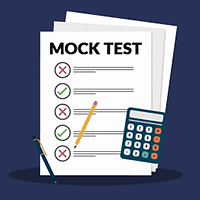UPSC Exam > UPSC Questions > How do I prepare for the UPSC CSE 2022 with o...
Start Learning for Free
How do I prepare for the UPSC CSE 2022 with only 7 months left?
Verified Answer
How do I prepare for the UPSC CSE 2022 with only 7 months left?
Know the exam well:
Before preparing for any exam, it is important to know the nitty-gritty of the exam well enough. Pick up the previous year papers and skim through them to get an understanding of what is actually asked in the exam.
Strengthen your foundation with NCERT & Standard Booklist:
No matter what your background is, you need to understand the basics of the core subjects of the UPSC syllabus. Hence, refer to NCERTs, they can be downloaded from the official website of NCERT for free. You can refer to the essential NCERTs books for each subject given below to save time. Questions and important concepts are usually based on these books.
1. History
3. Economics
4. Polity
5. Science & Tech
Once you have read all the NCERTs, it’s time to expand your knowledge by reading the standard books.
1. Modern History
2. Medieval History
3. Polity
4. Geography
5. Art & Culture
6. Economics
Maximum amount of time is spent while reading and making notes of the NCERTs and the standard books. You make use of the summaries available online to save time. EduRev currently has courses for all the subjects of the UPSC. You can find everything related to the above mentioned NCERTs and the recommended books there. These courses contain comprehensive topic-wise summaries, tests, videos and mind-maps.
Practice Answer Writing + Revision:
and revision play an important role in the entire scheme of UPSC preparation, especially for the UPSC Mains Exam. Once you have completed a subject from the NCERT as well as standard books, then you can start practicing answer-writing. Before that, it will be a futile exercise as you will have to depend on books for the content of the answer. Also at this stage, it is also important to incorporate consistent revision. You should keep your weekends free for a dedicated revision of whatever new you’ve learned during the week.
Choose an optional:
Give sufficient time to yourself to finally decide the optional. Take into consideration factors such as your own academic background, Interest, Time available and access to resources before selecting it. Try to revise it at least once before the prelims.
Essay Writing:
You can refer to or online EduRev to hone your essay writing skills. While many online sources only offer the prompts, EduRev shows the article along with the prompt. Being beginner friendly, it also gives an analysis of the content required for opening, body and closing of the essay.
Mock Based Test Learning approach:
Two months before the prelims exam, you should incorporate a learning approach. It will give you an exam feel. Sit for an actual exam-like mock test at the same time and then analyse your performance. Check your weak areas and brush up on the concepts that you may have missed. It will not only help you in anxiety management during the actual exam but will also prepare you extremely well for the exam!
Finally, prioritise on cracking GS-1 and CSAT as you won’t be able to give mains if you don’t clear them first. The core material for Mains and Prelims is the same, the point of difference is the application of that material.
 This question is part of UPSC exam. View all UPSC courses
This question is part of UPSC exam. View all UPSC courses

|
Explore Courses for UPSC exam
|

|
How do I prepare for the UPSC CSE 2022 with only 7 months left?
Question Description
How do I prepare for the UPSC CSE 2022 with only 7 months left? for UPSC 2024 is part of UPSC preparation. The Question and answers have been prepared according to the UPSC exam syllabus. Information about How do I prepare for the UPSC CSE 2022 with only 7 months left? covers all topics & solutions for UPSC 2024 Exam. Find important definitions, questions, meanings, examples, exercises and tests below for How do I prepare for the UPSC CSE 2022 with only 7 months left?.
How do I prepare for the UPSC CSE 2022 with only 7 months left? for UPSC 2024 is part of UPSC preparation. The Question and answers have been prepared according to the UPSC exam syllabus. Information about How do I prepare for the UPSC CSE 2022 with only 7 months left? covers all topics & solutions for UPSC 2024 Exam. Find important definitions, questions, meanings, examples, exercises and tests below for How do I prepare for the UPSC CSE 2022 with only 7 months left?.
Solutions for How do I prepare for the UPSC CSE 2022 with only 7 months left? in English & in Hindi are available as part of our courses for UPSC.
Download more important topics, notes, lectures and mock test series for UPSC Exam by signing up for free.
Here you can find the meaning of How do I prepare for the UPSC CSE 2022 with only 7 months left? defined & explained in the simplest way possible. Besides giving the explanation of
How do I prepare for the UPSC CSE 2022 with only 7 months left?, a detailed solution for How do I prepare for the UPSC CSE 2022 with only 7 months left? has been provided alongside types of How do I prepare for the UPSC CSE 2022 with only 7 months left? theory, EduRev gives you an
ample number of questions to practice How do I prepare for the UPSC CSE 2022 with only 7 months left? tests, examples and also practice UPSC tests.

|
Explore Courses for UPSC exam
|

|
Signup for Free!
Signup to see your scores go up within 7 days! Learn & Practice with 1000+ FREE Notes, Videos & Tests.



























